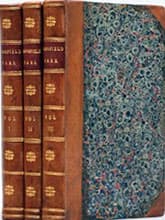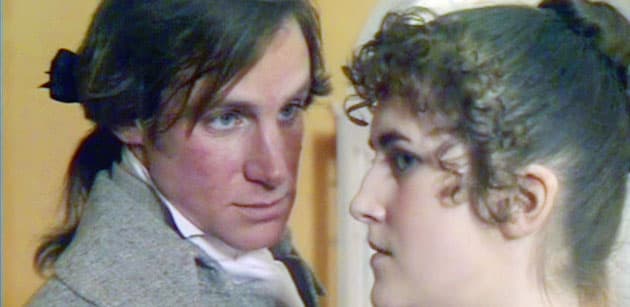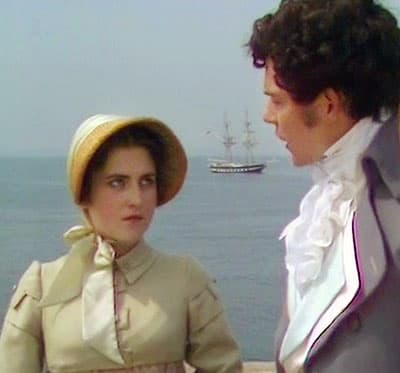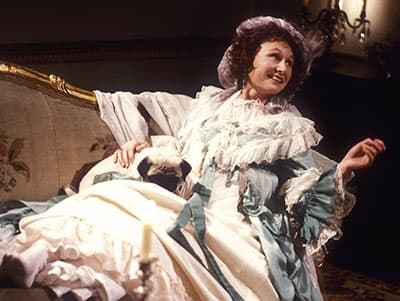Mansfield Park
Critique • Quotes • Text • At the movies
 1816 second edition
1816 second editionFirst publication
1814
Literature form
Novel
Genres
Literary, romance
Writing language
English
Author's country
England
Length
Approx. 160,000 words

Edmund (Nicholas Farrell) and Fanny (Sylvestra Le Touzel) in the 1983 BBC series.
Novel resisted adaptation
Mansfield Park (1983): Television miniseries, six episodes, 317 minutes; director David Giles; writer Kenneth Taylor; featuring Sylvestra Le Touzel, Nicholas Farrell, Christopher Villiers, Samantha Bond, Bernard Hepton, Angela Pleasence, Anna Massey, Robert Burbage, Jackie Smith-Wood
For whatever reasons, Mansfield Park went unadapted for film much longer than most of Jane Austen's novels. The first adaptation of the 1814 book I know of is the 1983 version, and that was made for television. It was relatively faithful to the novel, despite running less than an hour.
By contrast the first cinematic version in 1999 took purposeful liberties with the plot, theme and characters—and yet may make you question: what's so great about being faithful to a book anyway?
Further adaptations were to follow as the novel approached and passed its two hundredth anniversary. The first two remain the most interesting, albeit for opposite reasons, while a third major adaptation in 2007 falls somewhere between the extreme approaches of the first two.
The constant prig
What's interesting about the 1983 television drama is that given so many years to figure out how to adapt this problematic novel, the first attempt is so faithful to the book. It's as if the screenplay writer and director gave up thinking about how to translate Mansfield Park for a modern audience and decided just to give us the entire book as written, and rely on Jane Austen's relaxed storytelling skills to win us over.
Whether this is a successful strategy is open to debate. Critics and viewers seem sharply divided on this five-part BBC miniseries.
Some find it much too long and slow, proceeding through nearly all the interpersonal dramas drawn out through Austen's novel. Especially around the time that the young people staying at Mansfield Park plan the ill-fated play production, the plot seems tediously petty. Nothing much seems to be at stake except the public and secret pairing up of the various characters and the testing of Franny's resolve to always do the right and proper thing—her much vaunted constancy. This is when the girl, hardly a woman yet, appears most priggish, opposed not just to the goings-on of her supposed friends throughout the rehearsals but to putting on the scandalous play, Lovers' Vows, at all.
If anything, Sylvestra Le Touzel's Fanny is even mousier and more frustratingly placid than Austen's Fanny. She spends most of the series looking lost and aghast at what's transpiring around her at Mansfield. It's hard to understand where her strength and independence come from, especially after we've seen her miserable background in Portsmouth.
The most unforgiving role though may be that of Edmund Bertram. Nicholas Farrell does the best he can with a character who at heart is too good for the rest of the company at Mansfield Park, yet gets caught up in their affairs, until he's pulled back by the love—if it can be called that—of the ever-righteous Fanny. His whole purpose in life is to become the parson established on a country estate, a position that Austen has ridiculed in other works.
The villains of the piece, the Crawford siblings who lead the others astray with their sophisticated ways, faithful only to their own pleasures and profit, are actually welcome relief from all the goodness exuded by the central couple.
On the other hand, many an Austen fan has enjoyed this BBC adaptation of the novel because under all the seemingly bland moralizing they detect a subtle complexity of thought and feeling. Beneath the surface stereotyping, no character is all one thing or another.
Fanny really is befuddled as her rote morality does not always serve her well. Edmund really does have to struggle to find his way back to his better self.
And to the criticism that the acting of the two leads is stilted we can answer rather the acting accurately two characters who are stilted, hiding their inner turmoils beneath forcedly calm exteriors.
Even the wicked Crawfords have their moments of genuine caring.
The long length of this production also lets you get to know the minor characters better too. One standout is the loopy and seemingly self-absorbed Lady Bertram, played by Angela Pleasance, whose tiny voice and detachment from the events taking place around her are at first laughable but who grows on us to the point that we come to share Fanny's attachment to her.
It's the small scenes, the small touches, the small encounters in the nooks of the mansion, the sideways glances, the unfinished conversations—all the contradictory bits spread out over six episodes that recreate Austen's story in all its complexity.
A small part of that story, mention of the slave trade that is behind the wealth of the Bertram family and the glory that is Mansfield Park, is excised from this series.
Otherwise this is the closest you can come to Jane Austen's story on video, love it or hate it.
— Eric



